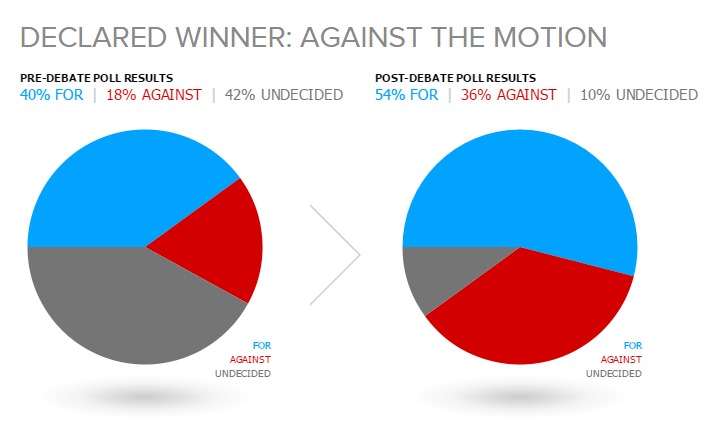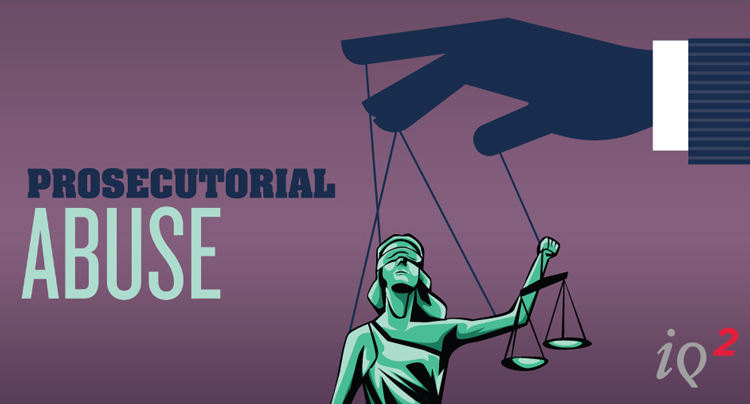Robert Rosenkranz: Intelligence Squared US Debate Analysis
U.S. Prosecutors Have Too Much Power
More than 90% of America’s prison population has never had a jury trial. Instead, they are in jail following plea bargains negotiated with prosecutors.
In these negotiations, prosecutors have vastly more bargaining power than the accused. Since plea bargaining saves time for judges, juries, and the entire apparatus of the court system, it is arguably an efficient approach. But does it produce just results?
That question has given rise to the latest Intelligence Squared U.S. Debate: “U.S. Prosecutors Have Too Much Power.” Following is an overview of how this debate played out.
The Debaters
Arguing in favor of the motion was former U.S. Federal Judge and current Senior Lecturer at Harvard Law, Nancy Gertner. Joining her was Paul Butler, a former federal prosecutor and current Professor at Georgetown Law.
Arguing against the motion was former federal prosecutor and former City of Chicago Inspector General David Hoffman. His partner was Reid Schap, also a former federal prosecutor. Both men are currently practicing at private law firms.
Arguments For The Motion
The team supporting the motion noted that criminal laws are so complex that virtually any offense can be construed as violating multiple laws. Since each violation carries a separate mandatory sentence, the prosecutor can threaten to “throw the book” at a defendant, putting him at risk of a very long jail sentence. By pleading guilty to a lesser offense, the defendant accepts a shorter time in prison.
Even if defendants are innocent, they will realize that there is some risk a jury will find them guilty; so the rational choice to accept the bargain. Even the best advised corporations pay billions of dollars in fines to avoid the uncertainties of jury trials; imagine how much greater the pressure is on an indigent defendant with a legal aid lawyer. And, since a disproportionate number of criminal defendants are black (African Americans now constitute nearly 1 million of the total 2.3 million incarcerated population), the potential abuse has a serious racial dimension.
Finally, prosecutors have every incentive to use their power aggressively. They climb their professional ladder by securing convictions; not by getting bogged down in lengthy trials.
Arguments Against The Motion
The team arguing against the motion emphasized that there are natural limits of power placed on prosecutors by the checks and balances system. They need to acquire the support of their superiors and colleagues, must convince grand juries, and gather enough evidence so they can expect to prevail in proving a crime “beyond a reasonable doubt”. In many cases, crimes are uncharged because this burden is too difficult to attain. In other cases, prosecutors might feel that mandatory penalties are simply excessive under the circumstances, and use their discretion to accept a plea to a much lesser offense. In instances like this, they are using their power to mitigate the risks faced by the accused.
The Results

Before hearing the debate, 40% of the audience voted for the motion, and 42% of the audience were undecided. After hearing both sides present their arguments, the team against the motion changed the most minds, doubling their votes from 18% to 36%. That more than 54% of the live audience changed their minds on this issue is indeed revealing of how complex and challenging this topic continues to be.
If we take a closer look at the results, we see that of the 54% that changed their minds, 22% shifted their votes from undecided to against, while 16% moved from undecided to against. See the complete breakdown here: http://intelligencesquaredus.org/debates/past-debates/item/1408-u-s-prosecutors-have-too-much-power
Where do you stand?
Watch the the full debate here and cast your vote online.




